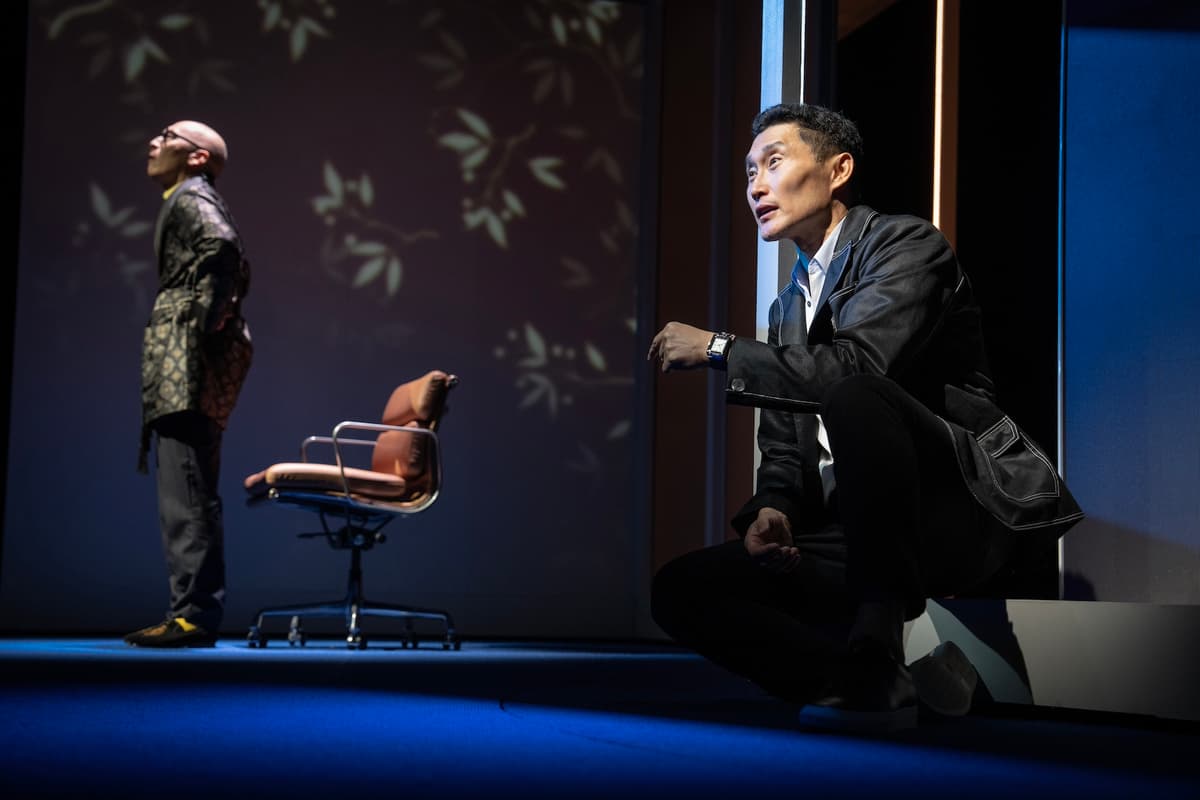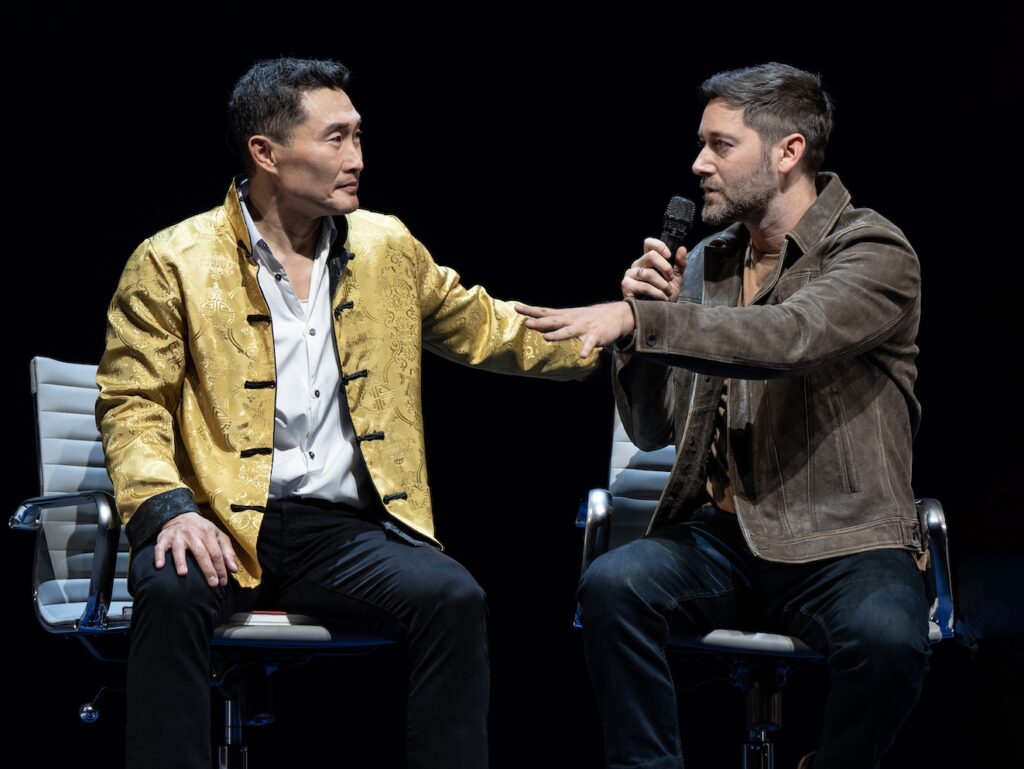Tony Winner David Henry Hwang’s 2007 Play ‘Yellow Face’ Makes Its Broadway Bow
Under Leigh Silverman’s sprightly direction, this new production confirms both Hwang’s flair for satire and his prescience as a social critic.

Memory plays seldom take the form of farce, but David Henry Hwang certainly had plenty of material for one when he wrote “Yellow Face” roughly two decades ago. Mr. Hwang was already a celebrated playwright at the time, having won a Tony and being named a Pulitzer finalist for his Broadway debut, 1988’s “M. Butterfly,” which drew on both the Puccini opera and a real-life relationship between a French diplomat and a Chinese opera singer to explore cultural conflicts, racial stereotypes, and gender identity.
Not long after that success, Mr. Hwang became a prominent voice in protests over the casting of a white actor, Jonathan Pryce, as a Eurasian pimp in the New York premiere of the mega-musical “Miss Saigon.” That experience helped inspire Mr. Hwang’s next Broadway outing, a comedy called “Face Value,” which featured a starry cast helmed by the venerated director Jerry Zaks — and was a spectacular flop, folding before it even opened, after just eight previews in 1993.
In 2007, “Yellow Face,” heavily informed by that fiasco — Mr. Hwang described the play in a recent Playbill interview as “essentially a rewrite or reconceptualization of ‘Face Value’” — fared far better, scoring him another Pulitzer nod and an Obie Award following stagings at Los Angeles and off-Broadway. This new production marks its Broadway bow, and under Leigh Silverman’s sprightly direction, it confirms both Mr. Hwang’s flair for satire and his prescience as a social critic.
Daniel Dae Kim, known to TV fans for his work in series such as “Lost” and last decade’s reboot of “Hawaii Five-O,” stars as the screamingly autobiographical DHH, who is revealed by his full name early on in skits that trace the road to “Face Value.” These incorporate an announcer who makes specific references to actual reviews and other newspaper articles — displayed in Yee Eun Nam’s artful projection design.

The New York Times emerges as a key source, and remains one throughout the play, which also focuses on Mr. Hwang’s relationship with his father, a Chinese immigrant and banker who is implicated in a scandal that reflects anti-Asian bias in both Congress and the press. A Times reporter is identified only by a flashing sign that reads “Name Withheld on Advice of Counsel,” as well as the disclosure that he contributed to the paper’s coverage of Wen Ho Lee, the Taiwan-born scientist who received a legal settlement from our government following his controversial indictment and imprisonment on charges of stealing nuclear secrets for China.
Yet “Yellow Face” is not strictly a historical document; Mr. Hwang fancifully mixes fact with fiction. There’s an invented character, Marcus G. Dahlman, a white actor whom DHH, still smarting from the “M. Butterfly,” unwittingly agrees to cast as the Asian lead in “Face Value.” This is after the casting director, Jay Binder — one of numerous real-life show-biz, media, and political figures comically represented in “Yellow Face” — convinces both himself and DHH that Marcus is at least part Asian.
Jerry Zaks, also a featured character, is skeptical at first, delicately noting that Marcus “doesn’t seem to possess … any Asian features … at all.” DHH takes umbrage at this: “And what exactly are ‘Asian features’? Short, nerdy, slanty eyes? … I gotta say, I find your question sort of offensive.”
One of the most refreshing aspects of “Yellow Face,” in fact, is how much fun the real Mr. Hwang has in addressing the difficulties of talking about race and, by extension, identity in general; these have only grown more pronounced since the play’s premiere. DHH, after learning of Marcus’s true heritage, tries to rectify the error by explaining the actor’s father was a Siberian Jew; “Marcus Gee,” as he is rechristened, embraces his new Asian-ness, even starring successfully in a tour of “The King and I.”
Marcus is played by another small-screen favorite, Ryan Eggold, an alumnus of “The Blacklist” and “New Amsterdam,” who manages his character’s evolution from nervous contender to eager pretender with an easy charm. The frustration Marcus eventually elicits in DHH also serves Mr. Kim, who in early scenes can seem to have his tongue stuck too firmly in his cheek; his performance gains humanity as he interacts more with the other players.
Greg Keller adroitly juggles the announcer and the Times journalist, and Kevin Del Aguila, Marinda Anderson, and Shannon Tyo are hilarious in a variety of roles, ranging from Dick Cavett and Lily Tomlin to a posse of Republican senators. But the part that gives this funny play its emotional core falls to theater veteran Francis Jue, who beautifully reprises his off-Broadway role as DHH’s dad, HYH.
While hardly a theater aficionado, HYH — Mr. Hwang’s late father was named Henry Yuan — is fiercely devoted to his son, and to his adopted country. “Even when I didn’t know anything more about America than I saw in Shanghai at the movies — even then, I knew my real life wasn’t the one I was living in China,” HYH tells his son in an early exchange, adding, “All those movie stars — Humphrey Bogart and Clark Gable and Frank Sinatra — they were the real me.”
HYH is eventually disillusioned, and his betrayal makes “Yellow Face” seem even more timely, and poignant. But then some of the best farces make serious points, and this one still holds up on the strength of both its humor and its heart.

